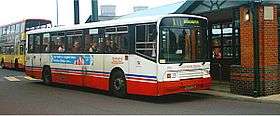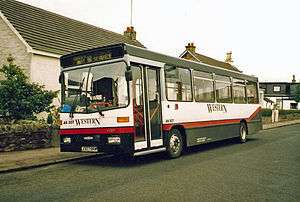South Yorkshire Transport
| Founded | 1986 |
|---|---|
| Headquarters | Doncaster |
| Service area | South Yorkshire |
| Service type | Bus operator |
South Yorkshire Transport (SYT) was formed in 1986, as a result of deregulation of bus services. The South Yorkshire Passenger Transport Executive (SYPTE) was no longer allowed to operate buses itself, so an arms length operating company was created.
SYT operated buses in and around Doncaster, Rotherham and Sheffield with some services extending to Chesterfield, Leeds and Barnsley. Known locally as 'one man buses', the company had by now dispensed with conductors and become driver operated vehicles.
In November 1993 South Yorkshire Transport was sold in a management buyout and rebranded Mainline.[1] Shortly after Stagecoach purchased a 20% stake in the company, however this was sold in 1995 to FirstBus.
Competition
SYT worked hard to maintain a dominant position for bus operations in most of South Yorkshire and were known to have bought out a number of smaller operators including Dearneways, Groves and earlier during SYPTE days Booth and Fisher.
Whilst SYT operated in most of South Yorkshire, Yorkshire Traction, a rival operator dominated Barnsley and half of Doncaster, which effectively split the county in two when considering bus transport.
Competition for routes and passengers grew fiercely from the mid-1980s and many new operators challenged SYT. A notable number were simply bought out and wiped off the road by SYT however one or two hung around to become a significant dent in the company's profits.
West Riding
One such project was when SYT began to expand and operate in West Yorkshire under the name Compass Bus. Allegedly in retaliation, West Riding buses returned the move by creating Sheffield and District Bus Co duplicating a number of routes in the north of Sheffield directly against SYT. In a dramatic move, the two companies withdrew from each other's main areas of operation dissolving both the S&D and Compass names.
Sheffield Omnibus
Other competitors who survived temporarily included Sheffield Omnibus. This was a move by employees from Preston Bus in Lancashire who moved a fleet of aging double-deck Leyland Atlanteans onto cross city services in Sheffield, matching SYT's fares and also operating later than SYT until midnight. The services proved an instant hit especially as the livery was similar to the old Sheffield Transport one from pre 1974 and the vehicles were the same core model as SYPTE had in the mid-1970s.
Arch competitor Yorkshire Traction bought Sheffield Onmibus along with smaller Leyland National operating company Yorkshire Terrier and South Riding buses which gave it a major foothold in Sheffield services for the first time.
Sheafline
SYT saw significant staff redundancies and on more than one occasion, staff losing their jobs set up in direct competition to SYT. One such venture was Sheafline. Their advantage was that the drivers already knew the routes, fares, timetables and just needed the buses to drive. So, pre-owned Leyland Fleetlines were bought and Sheafline was launched. It took SYT a number of years to buy out the business at which point the Sheafline buses were scrapped and drivers integrated back into SYT, the very company where they had previously worked.
Sheffield United Tours
To complicate matters further, a company which had ceased operating 20 years earlier, Sheffield United Tours was relaunched operating from the neighbouring garage to SYT's East Bank Road centre, and with early 1970s Daimler Fleetlines again, set its sights on duplicating the SYT route map. With some success, the company operated until the mid-1990s and were seen at the time as a possible real challenger to the SYT dominance.
Andrews Buses
This scenario repeated itself in a different format with Andrews buses. They were originally a well known PSV training unit in the city and bought a number of withdrawn PTE buses which were promptly repainted and pressed into service often on their old routes. Daimler Fleetlines were the preferred vehicles and the company after many years of service were merged into the aforementioned Sheffield Omnibus operation.
Impact on SYT
There were however many advantages to using SYT...
As SYT had inherited the PTE owned vehicles, it did continue a solid reputation for comfortable seats and for the remainder of the 1980s held impressive regularity on most routes.
Fares in South Yorkshire were the lowest in the UK. At just 2p per mile until 1986, services were very popular and there were over 200 routes plus works, schools and limited stop express services.
However, fares rose rapidly with the introduction of the monthly unlimited 'SYT Savercard' priced at £15. This was however just the beginning with fares that are now over £3 per day under First.
Not only that but services eroded significantly and past press releases from the company have quoted 'use them or lose them'. As fares rose, passengers declined at a similar rate. A trend that still continues today.
Operations
Doncaster
Buses in Doncaster were based at two garages in the borough.
The main depot was the former Doncaster Corporation garage on Leicester Avenue, close to Doncaster Racecourse. In the 1980s, a new workshop building was erected at the rear of the yard behind the garage. In the early 1990s, the main depot building was demolished and the land sold. This made way for a new Wickes DIY store. The new workshop, yard and small section of the old garage building, which contained a bus-wash facility, remained. The only access to the smaller depot was now on Leger Way.
The second garage, which was much smaller, was on Bootham Lane in Dunscroft.
Rotherham
Buses in Rotherham were based at a large garage on Midland Road, the present headquarters and also the location for the refurbishment of the complete remaining fleet of AEC Routemasters (which is why they sported SYT branded number plates).
Sheffield
Buses in Sheffield were operated from five garages; East Bank, Greenland Road, Halfway, Herries Road and Leadmill.
Fleet
The initial fleet was inherited from SYPTE. The standard double-decker bus was the Alexander-bodied Dennis Dominator, with some Leyland Atlanteans, Volvo Ailsas, Leyland-DAB articulated buses and Daimler Fleetlines some of which came from smaller companies taken over by SYT, such as Rossie Motors and Blue Ensign; the predominant single-decker being Leyland National and later the Volvo B10M. Other fleets bought by SYT were Renault/Reeve Burgess minibuses and Dennis Dominos.
As at the end of 2007, SYT is fondly remembered as from a time when fares were low, services were widespread, regular and vehicles had comfortable seating. There is an active SYT preservation society maintaining and rallying various vehicles from the SYPTE, SYT and Mainline plus an annual gathering each year at the Meadowhall Shopping Centre in Sheffield, usually the first Sunday in September.
South Yorkshire Transport Bus Museum also houses a number of examples of transport in the county.
See also
References
- ↑ South Yorkshire Transport Authority Sells Off Bus Company to Staff Local Government Chronicle 18 November 1993

